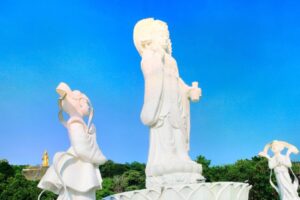Quan Yin Statue as Feng Shui Cure

Quan Yin is one of Buddhism’s major deities and one of the most popular deities used in feng shui. Known as the Goddess of Mercy and Compassion, Quan Yin is a well-known deity in China and Korea, Japan, and Malaysia, as well as with numerous Buddhism followers around the world.
Quan Yin Is Portrayed in Many Ways
You can find Quan Yin images holding the pearls of illumination or a bundle of ripe rice, pouring the nectar of wisdom and compassion from a sacred vase, or meditating and holding her hands in sacred mudras. You can also find Quan Yin holding children or giving food—all being expressions of her divine loving energy.
Protector and Benefactor
The One with a Motherly Compassion, She who Hears the Cries of the People are the Quan Yin’s attributes. A great protector and benefactor, her heart is full of deep compassion and unconditional love; her energy is God-like. Quan Yin is welcomed in many feng shui applications and is one of the most popular (and sacred) feng shui cures. Due to her commitment to helping humans, she is approached with any concerns, troubles, or worries. Be it family, career, health, or relationships. No trouble is too big to be brought to the motherly and all-powerful energy of Quan Yin.
The Energy of Quan Yin
The terms “compassion and mercy” are actually not the best interpretation of Quan Yin’s energy. The energy Quan Yin expresses akin to what a mother feels for her child. It is fiercely loving and protective, which is much stronger than what we usually associate with compassion. As the legend goes, even though Quan Yin attained enlightenment, just as she was about to enter heaven’s gate. She paused at the doorway and, hearing the cries of the world, decided to return and help humankind find the right path.
She took the vow to help humans. Thus Quan Yin is known as the female Bodhisattva.
Placements for Good Feng Shui
- Define the best Bagua placement of your specific Quan Yin statue by looking at its attributes, such as its color, the material is made of, and other details. A white Quan Yin statue is a wonderful feng shui cure for the West Bagua area. This is because the white color is the expression of the West’s Metal feng shui element. A green color Quan Yin sculpture made of jade can be a great addition to your East Bagua area. Green is an expression of the Wood feng shui element.
- Quan Yin can be a powerful cure in the annual feng shui flying star applications. Find out where her energy is most needed in a specific year. Then, place your statue of Quan Yin in the affected Bagua area. This will neutralize the negative energy of annual feng shui stars and strengthen the protective energy in and around your home.
- Never place your Quan Yin statue on the floor, in the kitchen, or the bathroom. A height of at least 3 feet is recommended for the good feng shui placement of your Quan Yin statue.
- You can also place the statue of Quan Yin close to your front door, facing the entrance. This will create a protective quality of energy at your entrance (the mouth of chi), as well as the most welcoming sight when coming home.
Conclusion
Feng shui originated in China many thousands of years ago. Some sources say feng shui goes back at least 5,000 years; some settle for 3,000. We will never know for sure, so all you can do is explore—with a discriminating eye. The powerful beauty of this ancient science and art.
Since feng shui is an ancient body of knowledge, most traditional or classical feng shui cures are based on mythical or culturally specific symbols and associations. Some classical feng shui cures, such as the Chi Lin, the Pi Yao, or the Fu Dogs—even though very popular with traditional feng shui school followers—are not very well known (or applied) Western home.
